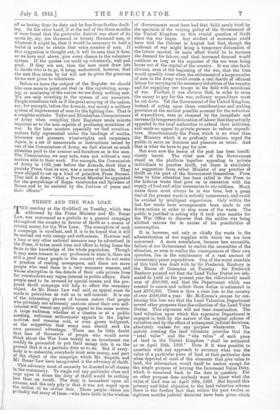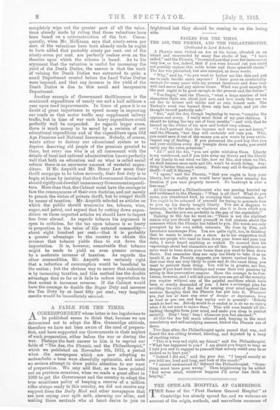THRIFT AND THE WAR LOAN. T HE meeting at the Guildhall
on Tuesday, which was addressed by the Prime Minister and Mr. Bonar Law, was announced as a prelude to a general campaign throughout the country in favour of thrift as a means of raising money for the War Loan. The conception of such a campaign is excellent, and it is to be hoped that it will be carried out with energy and enthusiasm. However well a loan or any other national measure may be advertised in the Press, it takes much time and effort to bring home the facts to the knowledge of the whole population. Though it may seem treason to our profession to state it, there are still a good many people in the country who do not make a practice of reading newspapers, and there are more people who read them in. a very summary manner, and whose absorption in the details of their own private lives far overshadows any vague interest in public affairs. Such people need to be aroused by special means, and the pro- posed thrift campaign will help to effect the necessary object. As Mr. Bonar Law well said, an appeal must be made to patriotism as well as to self-interest. It is one of the interesting phases of human nature that people who privately are extremely anxious about their own self- interest will resent any public appeal to the same motive. A large audience, whether at a theatre or at a, public meeting, welcomes enthusiastic appeals to the higher motives, and remains cold, or even grows indignant, at the suggestion that every man should seek his own personal advantage. There can be little doubt that tens of thousands of people who would never think about the War Loan merely as an investment can readily be persuaded to put their money into it on the ground that it is a patriotic duty so to do. But if every- body is to subscribe, everybody must save money, and part of the object of the campaign which Mr. Asquith and Mr. Bonar Law have inaugurated is the advocacy of thrift. This advocacy must of necessity be directed to all classes in the community. To single out any particular class and urge upon it alone the duty of thrift would be nothing less than an insult. The duty is incumbent upon all citizens, and the only pity is that it was not urged upon the nation at an earlier date. Those people—there are probably not many of them—who have faith in the wisdom of Governments must have had that faith sorely tried by the spectacle of the varying policy of the Government of the United Kingdom on this crucial question of thrift since the war began. Any student of economics could have told the Cabinet in August last that, though the outbreak of war might bring a temporary dislocation of the labour market, its main effect would be to increase the demand for labour, and that increased demand would continue as long as the expenses of the war were being borne out of the capital of the country. It was also fairly obvious, even at the beginning of the war, that the time would speedily come when the enlistment of a large number of men in the Army would create a real dearth of efficient labour for carrying on the necessary industries of the country and for supplying our troops in the field with munitions of war. Further, it was obvious that, in order to raise the money to pay for the war, ordinary expenditure must be cut down. Yet the Government of the United Kingdom, instead of acting upon these considerations and making provision at the earliest possible moment for the reduction of expenditure, were so obsessed by the immediate and necessarily temporary dislocation of labour that theyactually appealed to the local authorities to extend their activities, and made no appeal to private persons to reduce expendi- ture. Simultaneously the Press, which is no wiser than the Ministry which it so profusely criticizes, urged the public to carry on business and pleasure as usual. And that is what we have to pay for now. But even now the lesson of the past has been insuffi- ciently learnt. The chief men of the Government stand on the platform together appealing to private individuals to practise thrift, yet there is absolutely no suggestion from either Minister of any practice of thrift on the part of the Government themselves. From time to time attention has been called in the Press to the hideous waste that goes on in connexion with the supply of food and other necessaries to our soldiers. Much waste there must always be in war time, but a great deal of the present waste is entirely unnecessary, and could be avoided by intelligent supervision. Only within the last few weeks have arrangements been made to cut down rations in order to stop some of the waste. The public is justified in asking why it took nine months for the War Office to discover that the soldier was being allotted rations far in excess of his possibilities of consumption.
It is, however, not only or chiefly the waste in the administration of war supplies with which we are here concerned. A more scandalous, because less excusable, failure of our Government to realize the necessities of the situation, or even to realize the consequences of their own speeches, lies in the continuance of a, vast amount of unnecessary peace expenditure. One of the worst scandals of this kind was dealt with by Sir Frederick Banbury in the House of Commons on Tuesday. Sir Frederick Banbury pointed out that the Land Value Duties are esti- mated to yield in the present year the ridiculously small sum of £50,000, and that the Department which was created to assess and collect these duties is estimated to cost .6176,000. There is thus a clear loss to the country of over £600,000 a year. Mr. McKenna's excuse for con- tinuing this loss was that the Land Valuation Department served other purposes than the collection of the Land Value Duties. This argument will not bear examination. The land valuation upon which this expensive Department is engaged is, both by the nature of the original scheme of valuation and by the effect of subsequent judicial decisions, absolutely useless for any ' purpose whatsoever. The statute creating the land valuation provides that the " total value " and the " site value " of each piece of land in the United Kingdom " shall be estimated as on April 30th, 1909." Even if it were possible to ascertain with any approach to accuracy what was the value of a particular piece of land at that particular data when deprived of most of the elements that give value to land, the information would itself be useless except for the single purpose of levying the Increment Value Duty, which is measured back to the date in question. For no other purpose does anybody want to know what the value of land was on April 30th, 1909. But beyond this primary and fatal objection to the land valuation scheme there is the further fact that within the past twelve or eighteen mouths judicial decisions have been given which completely wipe out the greater part of all the valua- tions already made by ruling that those valuations have been based on a misconstruction of the law. Conse- quently, when Mr. McKenna says that ninety-seven per cent. of the valuations have been already made he ought to have added that probably ninety per cent. out of the ninety-seven per cent. are perfectly useless even on the theories upon which the scheme is based. As to his argument that the valuation is useful for increasing the yield of the Death Duties, the answer is that the work of valuing for Death Duties was entrusted to quite a small Department created before the Land Value Duties were imposed, and that any increase in the yield of the Death Duties is due to this small and inexpensive Department.
Another example of Government thriftlessness is the continued expenditure 'of nearly one and a half millions a year upon road improvements. In times of peace it is no doubt of great importance to spend money in improving our roads so that motor traffic may supplement railway traffic, but in time of war such heavy 'expenditure could perfectly well be suspended. As regards larger sums, there is much money to be saved by a revision of our educational expenditure and of the expenditure upon Old Age Pensions and National Insurance. Nobody, of course, wants either to destroy our educational system or to deprive deserving old people of the pensions granted to them, but every one who is at all conversant with the details of local and national administration knows perfectly well that both on education and on what is called social reform them is an enormous amount of wasteful expen- diture. If Mr. Asquith and Mr. Boner Law mean their thrift campaign to be taken seriously, their first duty is to begin at home by insisting that the Government themselves should rigidly cut dowthill unnecessary Government expendi- ture. More than that, the Cabinet must have the courage to face the consequences of their own doctrine, and not merely to preach the virtue of private thrift, but to compel thrift by means of taxation. Mr. Asquith selected as articles on which the public should economize tea, tobacco, wine, sugar, and petrol, and argued that by cutting down expen- diture on these imported articles we should have to import less from abroad. As regards tobacco his argument is open to criticism, for the tax upon tobacco is so heavy in proportion to the value Of the untaxed commodity— about eight hundred per cent.—that it is probably a greater advantage to the country to obtain the revenue that tobacco yields than to cut down the importation. It is, however, conceivable that tobacco might be made to yield an even greater revenue by a. moderate increase of taxation. As regards the other commodities, Mr. Asquith was certainly right that a reduction of consumption would be beneficial to the nation ; but the obvious way to secure that reduction is by increasing taxation, and this method has the double advantage that so far as it fails to reduce importation to that extent it increases revenue. If the Cabinet would have the courage to double the Sugar Duty and increase the Tea Duty by at least fifty per cent., very tangible results would be immediately secured.











































 Previous page
Previous page